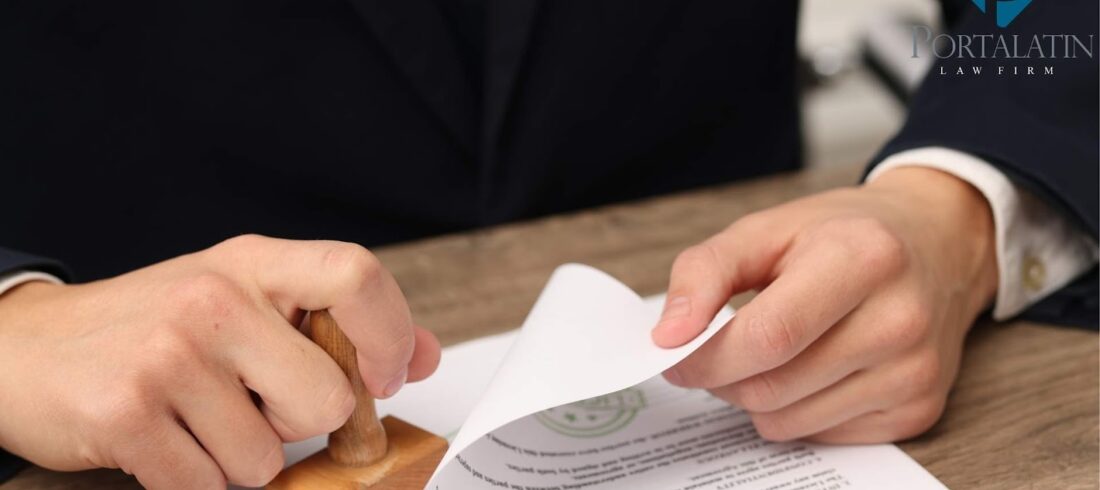We often find ourselves with questions about how best to protect our creative outputs and our business identity. Understanding the difference between copyright and trademark is an important first step.
Copyright immediately protects our artistic and literary works as soon as we create them, while trademarks protect the symbols, names, and phrases that define our brand to the public.
According to Facts MR, the copyright and trademark market is expanding from an estimated $1.15 billion in 2024 to a colossal $1.88 billion by 2034.
Although trademark law doesn’t require registration for protection, registering a trademark can significantly strengthen your legal standing. Grasping these fundamental concepts is key to effectively protecting your intellectual property.
With Portalatin Business Law Firm‘s services, you’ll find it easier to manage your business’s legal needs, which helps set up a strong base for your success and growth.
Key Takeaways:
- Copyright protects original artistic and literary works, while trademarks protect brand identifiers like logos and slogans.
- Copyright automatically protects works upon creation, while trademark protection requires actual use.
- Copyright requires registration for enforcing its rights; Trademarks do not require registration for enforcing rights, but it helps with legal defense..
What is Copyright?
Copyright is a legal protection, established by the U.S. Constitution, that applies to original works of authorship recorded in a tangible form, such as books, music, films, or artwork. It protects both published and unpublished works, giving creators exclusive rights to use, distribute, and reproduce their work.
What Does Copyright Protect?
Copyright makes sure that creators have exclusive rights to their work, including the right to reproduce, distribute, and display the work. Here are the types of works protected under copyright:
- Literary: These include novels, poetry, articles, and other written compositions.
- Artistic: This category encompasses paintings, drawings, photographs, and other visual art forms.
- Musical: These are compositions and can include any accompanying words.
The key aspect of copyright is that it protects the expression of an idea rather than the idea itself. For instance, while you cannot copyright the idea of a time machine, you can copyright a specific story or a detailed painting depicting a time machine.
How to Register Copyright and the Rights Granted
To register your copyright, visit the U.S. Copyright Office website, fill out the application, and pay a filing fee. It’s a straightforward process and a proactive step towards protecting your creative investments.
This process allows you to verify that your work is original, creative, and fixed in a tangible form. Although registration isn’t required, it offers significant copyright benefits, like legal evidence of ownership and the ability to sue for infringement.
What is a Trademark?
A trademark is a unique symbol, word, or design that identifies a business’s products or services and sets them apart from competitors. It helps consumers recognize the source of a product or service, making sure they know who is providing it.
Trademarks protect brand identity and prevent confusion in the marketplace.
Types of trademarks
Trademarks distinguish your products or services from those of competitors, covering various types that reflect different aspects of your business identity. Here are the types of trademarks you might consider to protect your brand:
- Word Marks: Text trademarks that protect the name of a product or company, such as ‘Google’ or ‘Nike’.
- Logos and Symbols: Graphical designs or icons that represent a brand, like the Apple logo or the Twitter bird.
- Slogans: Phrases associated with a company or product, such as McDonald’s “I’m lovin’ it”.
Registering these trademarks is important for leveraging their benefits and maintaining the integrity and value of your brand, thereby strengthening your position in the market.
How to Register a Trademark
Here is the process of registering a trademark:
- Selection of a Unique Mark: Choose a symbol or phrase that uniquely represents your product or service and confirm that it is not already in use.
- Application Filing: Submit an application with the United States Patent and Trademark Office (USPTO). This involves describing the mark, specifying the goods or services it will represent, and paying the required fees.
- Rights and Protection: Once registered, the trademark grants you exclusive rights to use the mark in commerce, differentiating your goods or services from those of others. This legal protection prevents others from using similar marks that could confuse consumers.
For entrepreneurs in markets like Miami, a trademark might be the name or logo that tells your customers, “This is us!”. Securing a trademark not only protects your brand but also enhances your business’s ability to stand out and thrive in a competitive environment.
What is the Difference Between Copyright and Trademark?

Copyright and trademark are both important in protecting intellectual property, but they serve different purposes:
Scope of Protection
- Copyrights protect the expression of ideas, such as books, music, and artwork.
- Trademarks focus on symbols, words, or phrases that distinctly identify a brand or service in the marketplace.
Duration
- Copyrights are designed to last for the life of the author plus 70 years, providing long-term protection that outlives the creator.
- Trademarks can last indefinitely, as reported by the USPTO, provided they are continuously used in commerce and renewed timely every 10 years. This ongoing use requirement makes sure that trademarks remain a permanent part of a company’s brand identity.
Registration Needs
- Copyright requires registration to be enforceable.
- Trademark registration with the United States Patent and Trademark Office (USPTO) strengthens your trademark rights.
- Although registration is not required in order to enforce trademark rights, it significantly strengthens your position in the event of an infringement case.
How to Protect your Intellectual Property

Here’s how to protect your intellectual property though copyright and trademark:
- Register Trademarks: It’s important to register your trademarks with the United States Patent and Trademark Office (USPTO) to secure exclusive rights.
- Secure Copyrights: Confirm that your copyrights are clearly attached to your work. Registration, while not mandatory, provides benefits like establishing a public record of your copyright and potentially facilitating infringement litigation.
Copyright Protection
Copyright makes sure that your creative works, such as articles, designs, or music, are legally recognized as your own. This protection prevents others from copying or profiting from your work without permission.
Trademark Protection
Trademarks protect your brand’s symbols, names, or slogans, confirming that only you can use them to identify your business. This helps prevent confusion in the marketplace, protecting consumers and your brand integrity.
Frequently Asked Questions
Can a Trademark Expire Due to Non-Use?
Yes, trademark registrations can expire if not actively used in commerce and renewed.
What Are Common Mistakes in Trademark Registration?
Failing to define your brand clearly can lead to unenforceable trademarks and legal challenges.
Is a Domain Name Considered a Trademark?
A domain name can act as a trademark if it identifies and distinguishes your business in the market.
Can Copyright Infringement Occur Unintentionally?
Yes, using protected work without permission, even unintentionally, is still infringement. Verify originality and permissions.
Secure Your Intellectual Property
Ready to take the next step in protecting and enhancing your business? At Portalatin Business Law Firm, we focus on not just meeting, but exceeding the legal needs of entrepreneurs and business owners. Our team is here to empower your business towards long-term success.
If you feel motivated to secure your business’s future, visit our contact page to learn more about how we can help you thrive in the competitive market. Let’s make your business goals a reality together!




